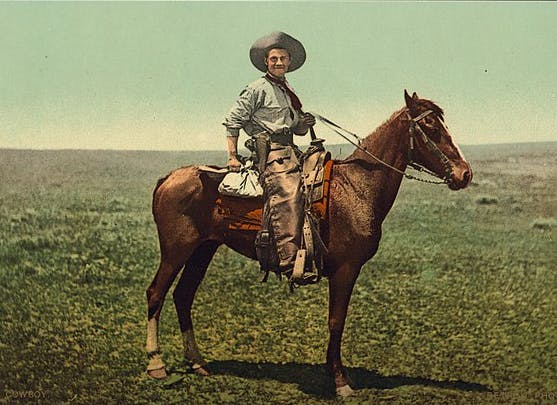Poem of the Day: ‘Introductory’ to Cowboy Poetry
The recent death of Baxter Black provides an occasion to take a closer look at the strange and wonderful cultural phenomenon known as Cowboy Poetry.

Rhyme and the rhythmical pounding of words will not die, no matter how hard we try to eliminate them. When sophisticated poetry turns against these elements of verse, they bubble up again from below — as they did, for example, in the wake of what once looked to be the complete triumph of modernist free verse in America’s literary journals and university writing programs. Up from below came rap lyrics, children’s verse, poetry slams, and, perhaps most unpredictably, the strange and wonderful phenomenon of Cowboy Poetry.
Baxter Black was a newspaper columnist, radio commentator, and raconteur who became the most visible face of the phenomenon. His recent death on June 10, at age 77, provides an occasion for The New York Sun to take a look at Cowboy Poetry here in the Poem of the Day feature.
To understand the phenomenon, however, we need to make some distinctions. There does exist some poetry a little more historically located in the old West. The work of Bret Harte (1836–1902) is commonly cited in this context, a western portion of the 19th-century literary movement of the Local Colorists (and Poem of the Day ran his poem “Coyote” here in the Sun in April). But much of what is taken as early Cowboy Poetry comes from slightly later, and it has a strongly nostalgic tone. Like Hollywood westerns, it was born of a reaching back for a world that had ceased to exist with the closing of the American frontier. Stephen Vincent Benét’s 1922 “The Ballad of William Sycamore” is a good example.
But then, in the 1980s, a new kind of cowboy poetry began to emerge in the United States. Often naive and sloppy (by the standard of 19th-century precision in meter and rhyme), it was ignored by literary journals and the more sophisticated of poetry readers. But it nonetheless spoke to listeners. Cowboy poetry festivals proliferated. New journals were formed. Local newspapers and radio stations joined in. The meter and rhyme of the poetry tightened, and contemporary topics of land ownership, water rights, and the economics of ranching began to appear.
The key figure who connects the old Closing of the Frontier poetry and the new western verse is today’s featured poet, Bruce Kiskaddon (1878–1950). His poems, reflecting his authentic experiences on the land, had a strange, barely-holding-on grasp on publication, appearing in small ranchers’ journals and calendars given to customers by stockyards. But they never quite faded away, and today Kiskaddon is recognized as the core of Cowboy Poetry. He began his 1924 collection Rhymes of the Ranges with a poem called “Introductory” — which seems a perfect introduction to Poem of the Day’s week of Cowboy Poetry in the Sun: “the days and the nights in the saddle.”
Introductory
by Bruce Kiskaddon
These are just a few rhymes of old friends and old times,
And I hope before I am through —
Just once in a while they will bring a broad smile,
To the face of some old buckaroo.
Wherever he worked in the days that are past,
On the mountain, the plain or the valley,
What matters is now if he tied hard and fast,
Or tumbled his steer with a dally.
If he wrangled the bunch, if he rode gentle strings,
If he topped off the wild ones that shimmy —
If he rode with his leathers through centre fire rings,
Or sat on a double-rigged rimmy.
If he worked for big outfits far out on the plains,
Where they never had use for a packer,
Or back in the hills in the snow and the rains,
With the regular old greasy sacker.
If he worked as a drifter and trusted to luck,
If he managed a bunch of his own;
If he cooked at the wagon and put up the chuck,
Or held down a line camp alone.
They are plain simple tales, of the round-ups and trails,
When he worked on the range with the cattle;
Not of wild woolly nights, nor of gambling hall fights,
But the days and the nights in the saddle.
___________________________________________
With “Poem of the Day,” The New York Sun offers a daily portion of verse selected by Joseph Bottum with the help of the North Carolina poet Sally Thomas, the Sun’s associate poetry editor. Tied to the day, or the season, or just individual taste, the poems will be typically drawn from the lesser-known portion of the history of English verse. In the coming months we will be reaching out to contemporary poets for examples of current, primarily formalist work, to show that poetry can still serve as a delight to the ear, an instruction to the mind, and a tonic for the soul.
